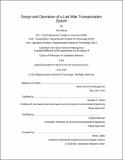Design and operation of a last mile transportation system
Author(s)
Wang, Hai, Ph. D. Massachusetts Institute of Technology
DownloadFull printable version (1.474Mb)
Other Contributors
Massachusetts Institute of Technology. Operations Research Center.
Advisor
Amedeo R. Odoni and Cynthia Barnhart.
Terms of use
Metadata
Show full item recordAbstract
The Last Mile Problem refers to the provision of travel service from the nearest public transportation node to a home or office. Last Mile Transportation Systems (LMTS) are critical extensions to traditional public transit systems. We study the LMTS from three perspectives. The first part of this thesis focuses on the design of a LMTS. We study the supply side of LMTS in a stochastic setting, with batch demands resulting from the arrival of groups of passengers at rail stations or bus stops who request last-mile service. Closed-form bounds and approximations are derived for the performance of LMTS as a function of the fundamental design parameters of such systems. It is shown that a particular strict upper bound and an approximate upper bound perform consistently and remarkably well. These expressions can therefore be used for the preliminary planning and design of Last Mile Transportation Systems. The second part of the thesis studies operating strategies for LMTS. Routes and schedules are determined for a multi-vehicle fleet of delivery vehicles with the objective of minimizing the waiting time and riding time of passengers. A myopic operating strategy is introduced first. Two more advanced operating strategies are then described, one based on a metaheuristic using tabu search and the other using an exact Mixed Integer Programming model, which is solved approximately in two stages. It is shown that all three operating strategies greatly outperform the naive strategy of fixed routes and fixed vehicle dispatching schedules. The third part presents a new perspective to the study of passenger utility functions in a LMTS. The unknown parameters of a passenger utility function are treated as unobserved events, and the characteristics of the transportation trips made by the passengers are treated as observed outcomes. We propose a method to identify the probability measures of the events given observations of the frequencies of outcomes by introducing the concept and assumptions of the Core Determining Class. We introduce a combinatorial algorithm in which the noise in the observations data is ignored and a general procedure in which data noise is taken into consideration.
Description
Thesis: Ph. D., Massachusetts Institute of Technology, Sloan School of Management, Operations Research Center, 2015. This electronic version was submitted by the student author. The certified thesis is available in the Institute Archives and Special Collections. Cataloged from student-submitted PDF version of thesis. Includes bibliographical references (pages 143-149).
Date issued
2015Department
Massachusetts Institute of Technology. Operations Research Center; Sloan School of ManagementPublisher
Massachusetts Institute of Technology
Keywords
Operations Research Center.